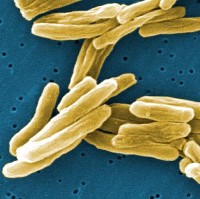The Bill and Melinda Gates Foundation awarded today $7.7 million in funding to identify biomarkers for diagnosing tuberculosis (TB) in low-resource settings. The 10 awards aim to promote research into TB biomarkers that leads to a simple, low-cost tool to quickly and accurately diagnose TB in developing countries.
One of the primary grant recipients is SomaLogic Inc., a diagnostics developer in Boulder, Colorado. The grant will find the work of Urs Ochsner, who heads the company’s group on infectious diseases, to apply SomaLogic’s proteomic technology to detect certain protein biomarkers of tuberculosis bacteria.
The company says its technology is based on protein-detecting reagents, with advantages over current tests in terms of accuracy, sensitivity, stability (e.g., no need for refrigeration), ease of production and cost. Its tests can detect and analyze thousands of proteins over a range of concentrations in just a few drops of blood or other substances in a single assay. These properties, says SomaLogic, are among the factors needed for simple point-of-care diagnostic devices for TB sought by the Gates Foundation.
Quanterix Corporation in Cambridge, Massachusetts will take part in a project led by Forsyth Institute in Cambridge and Beth Israel Deaconess Medical Center in Boston. That research aims to validate seven M. tuberculosis proteins found in the urine of tuberculosis patients as biomarkers. If successful, those findings could lead to a simple, non-invasive point-of-care test for TB, similar to a home-pregnancy test.
Advantageous Systems (ADS) in Pasadena, California is partnering with the University of Medicine and Dentistry of New Jersey to develop a diagnostic technology that uses paramagnetic nanoparticles combined with capture antibodies to extract M. tuberculosis bacteria from a patient’s sputum sample. ADS has developed non-invasive diagnostic devices to detect a range of diseases in blood samples.
The Gates Foundation says TB that affects some 8.8 million people often relies upon laboratory-based technology, which fails to diagnose a significant portion of active TB cases or requires weeks to do so and misses patients without access to these facilities. The program is part of the foundation’s Grand Challenges in Global Health initiative that aims to overcome bottlenecks by creating new tools that can radically improve health in the developing world.
Read more: Gates Foundation, Grand Challenges Canada Fund TB Diagnostic
* * *


 RSS - Posts
RSS - Posts
You must be logged in to post a comment.